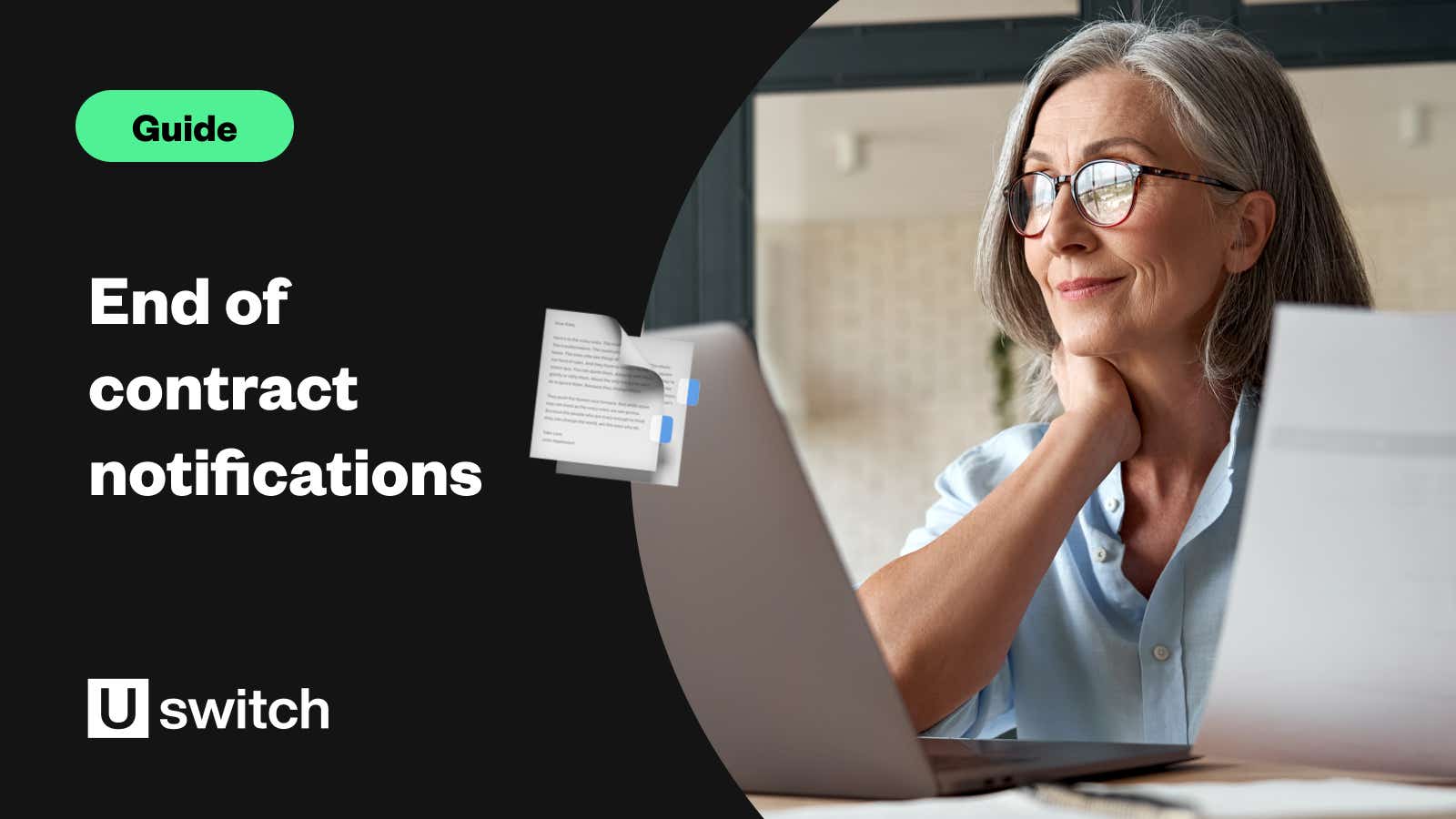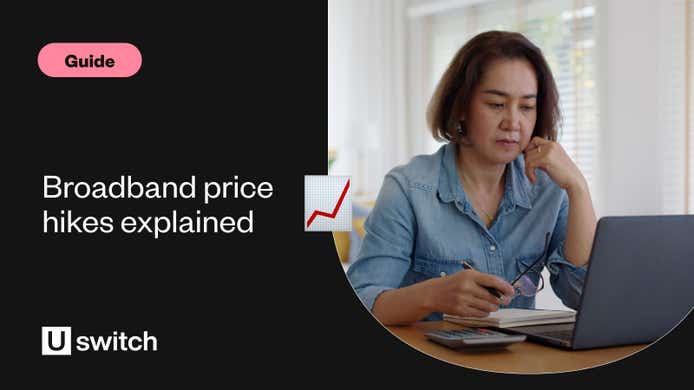What happens when your phone contract ends?
When you come to the end of your mobile contract your phone will still continue to work as normal and a few things should happen:
- Your monthly costs will decrease if you've paid off the cost of your handset, as you'll only be paying for your calls, texts and data now.
- Your contract should switch to a rolling month-by-month contract, leaving you free to switch to a new deal or a new network if you want better coverage, more benefits or a cheaper deal.
- You should receive an 'end of contract' notification from your network at least 30 days before your contract is up informing you of your new rates as well as a few options.
How do I find out when my phone contract ends?
You can find out when your contract is due to end by texting the word INFO to 85075.
Your mobile provider must also contact you with an end-of-contract notification between 10 and 40 days before your contract ends.
Networks must communicate via the same method you use to receive other updates – i.e., by text, email, or post.
Check your email spam folder and SMS messages to ensure you haven't missed this. If you haven't received a notification, you can check directly with your provider to determine when your contract ends.
If you have an online account or use your network's app to pay your bill or check your usage, your contract dates will be available there.
When does my phone contract end?
Contact your network directly to find out when your phone contract ends.
BT
Phone BT on 0800 800 150, or in your online account under ‘Your bills and usage’.
EE
Phone EE on 0800 956 6000, or in your online account under 'My Plan' - 'My Plan details'.
O2
Phone O2 on 0344 809 0202, or in your online account under 'Menu' - 'More' - 'Tariff and payments'.
Plusnet
Call Plusnet on 0800 432 0200
Sky
Phone Sky on 0333 7591 018, or in your Sky Message Centre under a message titled 'Confirming your Sky offer'. This message should tell you the start date and length of your contract.
TalkTalk
Phone TalkTalk on 0345 172 0088, or in your online account under - ‘My Account’ - ‘My Package’.
Tesco
Contact Tesco Mobile on 0345 301 4455, or in your online account under ‘Manage tariff and bundles’.
Three
Phone Three on 0333 338 1001, or in your online account under ‘Upgrades and offers’ - ‘Check if you can upgrade’ - ‘Minimum term’.
Virgin Media
Phone Virgin Media on 0345 454 1111, or in your online account under 'My Account' - 'Check your contract details'.
Vodafone
Phone Vodafone on 0333 304 0191, or in your online account under ‘Upgrade or Change plan’.
What are end of contract notifications?
As of 15 February 2020, all broadband, phone, pay-TV and mobile phone providers are now required to notify customers when their contract is about to expire. This lets customers know that they can start shopping around for a better deal.
Industry regulator Ofcom has implemented both end-of-contract notifications (ECNs) and out-of-contract notifications (also known as annual best tariff notifications), something Uswitch has heavily campaigned for over the years.
When you're eligible to switch, you’ll receive a letter, email, or text to let you know your contract is ending.
This is a real victory for consumers, as you’ll now be told when you’re free to look at other tariffs and ultimately save money with a better deal.
Ofcom End of Contract Notifications regulations
According to recent studies, as many as 8.8 million people in the UK pay over the odds for their broadband after their initial contract is up, and millions of UK customers continue to be charged for the price of their mobile phone long after they've paid it off.
Ofcom is now trying to put a stop to this 'culture of over-payment' by insisting broadband and mobile phone providers inform their customers when they're close to the end of their contract so they can seek green provider pastures in the shape of a better deal.
Networks and providers are now legally obligated to get in touch with you 10 to 40 days before the end of your contract to let you know you'll soon be free to shop around for a new mobile or broadband deal.
If you choose to stay with your provider, they must still contact you once a year when you're out of contract to remind you that you're eligible to switch.
Do you know if you're still in a mobile or broadband contract?
Until now, it has been up to the customer to determine whether they're in or out of contract.
And because of that, mobile and broadband providers have been able to get away with overcharging millions of customers who weren’t aware they were eligible to switch to a better deal.
Broadband providers, for example, often attract new customers with discounted deals. However, the price of the deal normally applies only during the initial minimum contract term (usually 12 to 24 months). After this period, your monthly payments are likely to go up quite dramatically — something that isn’t always made clear to consumers when they sign up.
Meanwhile, millions of mobile users have been stung for extra cash as networks continue to charge them for their handsets long after they’ve paid the phone's price.
But now that mobile and broadband providers have to let you know when you’re free to switch, it’ll be much easier to avoid being overcharged.
When will I receive my end-of-contract notification?
Both broadband and mobile providers will now be required to contact you between 10 and 40 days before the end of your contract. They'll also have to contact you every year that you're out of contract with information about your current tariff and the best deals available.
So even if you choose not to take any action once your contract has run out, you'll be reminded of what else is available.
These are officially known as Annual Best Tariff Notifications (ABTN) and began rolling out to broadband, pay-TV, and mobile phone customers on 15 February 2020. So, if you’ve been out of contract for a while, you likely would have received one by now.
What information will I get in my end-of-contract notification?
There are four pieces of information that every broadband, pay-TV, and mobile phone provider must include:
- The price the customer is currently paying
- The end date of their current contract
- The new price the customer will be paying once their contract ends
- The best alternative deals that the provider can offer
Here are some other things that should be included:
- Information about the notice period (or if a notice period applies)
- Confirmation that there will be no exit fees after the contract end date
- Details of all the services included in your subscription, including pay TV, streaming services, insurance or handset costs
- Other contracts with your provider and end dates (where termination of one would impact the other)
- How to terminate the contract
- Options available to the customer
How will I receive my end-of-contract notification?
Regulations stipulate that providers communicate using your preferred method, which could be by post, email, or text message.
So, keep an eye on your inbox and always read messages from your provider so that you don’t miss important information.
The benefits of end-of-contract notifications
The great news is that anyone who has a mobile phone or broadband package will ultimately benefit from end-of-contract and out-of-contract notifications. So that's most people.
While some savvy customers monitor when their contracts expire, most of us could use a convenient reminder to save some money.
And now that more customers than ever will be shopping around, we’re hoping to see deals becoming even more competitive.
Richard Neudegg, head of regulation at Uswitch.com, says: “For years, providers have profited from not always being entirely transparent about the status of their contracts.
“The introduction of end-of-contract notifications and annual out-of-contract reminders should finally put an end to this murky practice and help consumers know the best time to consider their options.
“Our figures suggest mobile and broadband consumers could be £1 billion a year better off if they take the opportunity to move to a better value deal.
“Uswitch has spent years campaigning for these measures, which we hope will give a much-needed shake-up to the industry and put more power in consumers’ hands to get off packages that are no longer good enough."
Out-of-contract notifications
Officially known as Annual Best Tariff Notifications (ABTNs), out-of-contract notifications require every mobile phone and broadband provider to communicate regularly with customers who are out of their initial contract to remind them that they don’t have to stay on the same tariff.
Some 20 million out-of-contract customers should have received their first notification from providers on 15 February 2020. From that date, each customer not subject to a fixed commitment period will start to receive one notification per year.
What information will be in my out-of-contract notification?
Ofcom, the telecoms industry regulators, has put together the following items that legally must be included in your notifications:
- The fact that you are not within a fixed commitment period for the contract
- Your current monthly price
- Information about your notice period (or if a notice period applies)
- Your current services (including ancillary services)
- Other contracts you have with that provider and their end dates (where termination of one would impact the other)
- Options available to you
- The providers’ best tariffs
Broadband end-of-contract notifications
Figures from Ofcom suggest that nearly nine million customers collectively overpay by a staggering £1 billion each year for their broadband and TV services.
As they complete their initial contract, customers are then faced with a price jump of about 28%. That's a big increase.
And as many people aren’t aware of this or forget when their contract is up, they keep paying the higher price long after they’re free to shop around for a cheaper deal.
End-of-contract notifications mean that millions of customers will be made aware of this and will be given a chance to switch and save rather than stay put and overspend.
Want to switch to a better broadband deal? Compare broadband deals with Uswitch.
End-of-contract notifications from broadband providers
As of February 2020, broadband providers must send end-of-contract notifications to customers whose fixed-term contracts are ending. However, Ofcom has intentionally left how they should communicate these reminders quite open to interpretation. So, the notification you receive could be slightly different depending on your provider.
Here’s what we know about certain broadband providers’ end-of-contract notifications so far.
BT
BT broadband end of contract notification
BT will send you a reminder that your contract is ending before your fixed-term end date. Along with information on the terms of your current contract, the notification will tell you what your rights are and offer you some of the best tariffs they have available at the time.
If you choose not to re-contract or switch, BT will move you onto a 30-day rolling contract. This plan will likely be more expensive because all BT promotions that applied at the time will be removed once you’re out of contract.
If you’re already out of contract, BT will send you a notification once per year to remind you that you can re-contract with them at any time. But it also means you’re able to switch to another broadband provider if it offers a deal that’s better suited to you.
Sky
Sky broadband end of contract reminder
Both Sky’s website and its terms and conditions for broadband have no mention of end of contract notifications. However, the provider must still comply with Ofcom’s policy, so it must send a reminder 10-40 days before the end of your contract, and then an annual reminder to let you know you’re out of contract.
All of Sky’s broadband contracts last for 24 months, so if it’s been roughly that length of time since you last took out a contract, you could already be eligible to renew or switch.
Virgin Media
Virgin Media end of contract notifications for broadband
Since Ofcom’s policy applies to both broadband and mobile customers, Virgin Media and Virgin Mobile communicate their end of contract notifications to customers in the same way.
On its end of contract notification FAQ page, it commits to the 10-40 day notice period that the reminder should be sent with, and it acknowledges that monthly prices may change once your fixed-term contract finishes.
The provider also allows you to download a copy of your notification from your My Virgin account page. Once you decide what you’d like to do with your contract, you need to give Virgin Media 30 days’ notice before your service can be changed or stopped.
TalkTalk
TalkTalk end of contract reminder
Before your contract comes to an end, TalkTalk will notify you that you can re-contract or switch your broadband provider to stay at similar prices to what you’re currently paying. If you choose not to renew or switch, you will stay on the same service, but be charged at a new, higher rate — the specific price of which will be stated in the notification.
Renewing your contract with TalkTalk usually takes between 48 and 72 hours, but if you haven’t seen evidence of your order within 72 hours you should get back in touch with its customer service team.
You will also be completely free to switch to another broadband provider once you receive your end of contract notification. It’s worth considering the new offers TalkTalk offers you, but if you can find a more suitable deal elsewhere then you should definitely consider moving on.
EE broadband
EE broadband end of contract notification
EE will send you an end of contract reminder at least two weeks before your fixed-term agreement finishes.
It will contain a selection of EE deals based on your current monthly bill and your data usage. However, you will also have the opportunity to switch to another provider, so it is well worth shopping around before upgrading.
If you choose not to renew your contract, EE will send you an annual reminder 12 months from the initial date that your fixed-term ended. It will then continue to do so once a year from then on. This reminder will contain a range of new EE deals, although they might not be the most competitive deals. So it is always a good idea to do a price comparison search online.
Was I overcharged for my mobile phone contract?
In 2018, Citizens Advice estimated that four million people in the UK were overcharged for handsets they'd already paid off, totalling £490 million in charges. 2017 was a similar case, with customers often paying up to £450 a year after they’d paid off the cost of their phones.
In the past, despite pressure to do otherwise, mobile phone carriers were under no obligation to inform their customers or refund any overcharged fees.
These instances of over-charging will be a thing of the past with the introduction of end-of-contraction notifications and annual best tariff notifications. Customers will now be informed of exactly how much they’re being charged and what they’re paying for.
Want to switch to a better mobile deal? Here are all our best mobile phone deals.
Do you prefer a SIM only deal? Take a look at all our best SIM only deals.
End-of-contract notifications from the major mobile network providers
Similarly, since last year, all of the UK’s mobile networks have been sending out end-of-contract notifications to their customers in compliance with Ofcom’s policy.
However, since there is currently little guidance on how they should look, the providers have taken slightly different approaches to communicating them.
O2
O2 end of contract tariff options
When your O2 contract is coming to an end, the network operator will get in touch with you via text or email. If you happen to be out of contract with O2 already, it will send you an annual reminder that you’re still paying for an old tariff.
In these notifications, O2 will offer you a selection of new plans that you could move onto once your fixed-term is finished. However, you should also get the option to cancel your contract.
While the plans it offers you will be better than just remaining out of contract, O2’s offers might not necessarily be the best on the market for your needs. So make sure you look elsewhere for similar deals to see if you could get a better deal with another provider.
Customers who have signed up directly with O2 will be automatically moved to a30-day rolling contract that comes with an equivalent monthly allowance of calls, texts and data.
However, so far it has made no specific commitments to provide reduced prices for those who purchased contracts and handsets from third parties such as Carphone Warehouse. And as this accounts for the majority of phone sales in the UK, most O2 customers will not be put on a cheaper plan automatically.
Vodafone
Vodafone end of contract notification
Vodafone will let you know via text or email that your fixed-term agreement is coming to an end. It will also remind you once a year if you’re out of contract to ensure you are aware of the range of options you have. This includes the opportunity to upgrade your plan to a new tariff.
With Vodafone, you will continue to pay the same amount for the same contract terms if you choose not to renew or switch. This means that if you signed up for a handset deal, you will still be paying extra for a phone you have already paid off. Moving onto a new contract will ensure you’re getting the most from the money you’re spending.
Three
Three end of contract reminders
Three hasn’t published exact details on how it communicates end of contract or annual best tariff notifications based on Ofcom’s guidance. However, like all other mobile network providers, it has committed to offering its customers the option to renew their Three contract, upgrade to another tariff or cancel their Three contract after its end date.
Any one of those three options is more cost-effective than staying out of contract, especially because unlike some other providers, Three is yet to make a commitment to apply a monthly discount to out of contract customers. So make sure to weigh up the above options once your fixed plan comes to an end.
Tesco Mobile
Tesco Mobile contract ending reminder
There’s not much detail on Tesco Mobile’s website about end of contract notifications, but like other providers it will send you a reminder when your contract is close to ending. Plus, it has also reduced its out of contract prices in line with EE.
The message you receive from Tesco Mobile will contain options to either upgrade to a new tariff, which you can do for no extra cost, or to cancel your contract and find a new contract elsewhere.
Virgin Mobile
Virgin Mobile contract end date notification
Virgin Mobile moves its out-of-contract customers onto monthly rolling plans with equivalent data and minutes after their fixed plan ends, and will continue to bill you in the same amount for its service. So once again, while your monthly bill won’t increase, you’ll still be paying more than you need to for an outdated plan.
This means, as is the case with other providers mentioned, starting a new contract with either Virgin Mobile or another provider will probably still work out cheaper for you, so it’s well worth shopping around.
If your contract is coming to an end soon, or if you’ve received an out of contract notification from your provider, compare our best mobile phone deals to see if you could get a tariff that’s more suited to you.
Need to upgrade your phone?
Compare the best-selling mobile phone deals from the UK's biggest networks.




